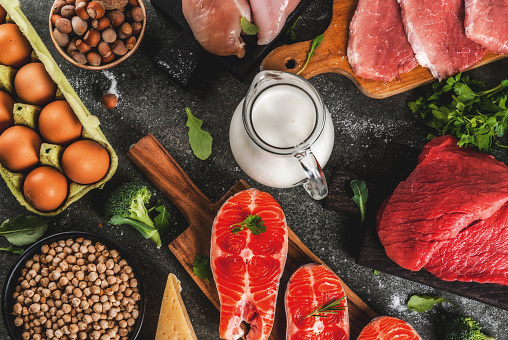What are the Benefits of a High-Protein Diet?

What are the Benefits of a High-Protein Diet?
A high-protein diet is a popular diet trend that has gained immense popularity in recent years, especially among fitness enthusiasts and athletes.
What is a high-protein diet?
A high-protein diet is essentially a diet that includes a significantly higher proportion of protein-rich foods, such as:
- Meats
- Dairy products
- Eggs
- Legumes
- Nuts, and seeds.
A high-protein diet is often touted as an effective way to build muscle mass, increase strength, and aid in weight loss. This article will explore the benefits and limitations of this diet, as well as the best ways to incorporate it into your routine.
Benefits of a Hig- Protein Diet
Builds and Maintain Muscle Mass
One of the primary benefits of a high-protein diet is that it can help build and maintain muscle mass. Protein is essential for muscle growth, repair, and recovery after exercise. Therefore, consuming high-protein foods can help improve muscle strength and performance, especially when combined with a regular exercise regimen.
Aids Weight-loss
A high-protein diet can help with weight loss. Protein is a satiating nutrient that keeps you full for longer periods, reducing the urge to snack on unhealthy foods between meals. A high-protein diet can also boost your metabolism and increase the number of calories you burn throughout the day, making it easier to lose weight and keep it off.
Reduces the risk of certain non-communicable diseases
Research suggests that a high-protein diet may have numerous health benefits, such as reducing the risk of heart disease, diabetes, and certain types of cancer. Protein-rich foods are low in unhealthy fats and sugars, which are known to contribute to chronic diseases.
Limitations of a High-Protein Diet
While a high-protein diet has many benefits, it is not suitable for everyone. People with kidney disease or other kidney-related issues should avoid a high-protein diet, as consuming too much protein can exacerbate these conditions. Similarly, individuals with liver disease or gout should consult their doctors before starting a high-protein diet.
Another potential drawback of this diet is that it can be difficult to sustain in the long term. High-protein foods can be more expensive than other foods, and some people may find it challenging to incorporate them into their diets consistently.
It is important to note that consuming too much protein can have adverse health effects, such as dehydration, constipation, and nutrient deficiencies. Therefore, it is essential to consume high-protein foods in moderation and ensure that your diet contains a variety of nutrients and vitamins.
How to Incorporate High-Protein Foods into Your Diet
If you are interested in trying a high-protein diet, there are several ways to incorporate such foods into your meal. Here are some tips:
- Start with breakfast: Incorporate protein-rich foods into your breakfast to give your body a protein boost first thing in the morning. Examples of high-protein breakfast foods include eggs, Greek yogurt, cottage cheese, and protein shakes.
- Plan your meals: Plan your meals to ensure that you are getting enough protein throughout the day. Include protein-rich foods in each meal and snack, such as grilled chicken, turkey, lean beef, fish, tofu, nuts, and seeds.
- Choose healthy sources of protein: Choose protein-rich foods that are low in unhealthy fats and sugars. Examples of healthy protein sources include lean meats, fish, beans, lentils, quinoa, and Greek yogurt.
- Consider protein supplements: If you struggle to consume enough protein through your diet alone, consider adding protein supplements into your routine. Whey protein powder, for example, can be added to smoothies or shakes to increase your protein intake.
- Drink plenty of water: High protein diets can be dehydrating, so it is essential to drink plenty of water throughout the day to prevent dehydration and constipation.
